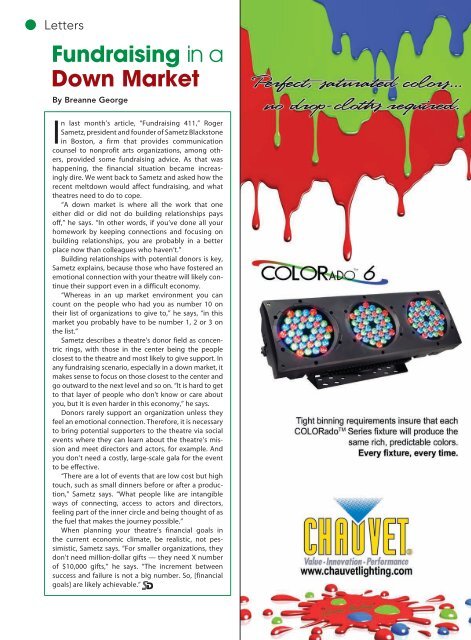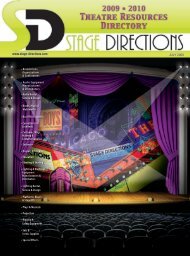Download a PDF - Stage Directions Magazine
Download a PDF - Stage Directions Magazine
Download a PDF - Stage Directions Magazine
- No tags were found...
Create successful ePaper yourself
Turn your PDF publications into a flip-book with our unique Google optimized e-Paper software.
LettersFundraising in aDown MarketBy Breanne GeorgeIn last month’s article, “Fundraising 411,” RogerSametz, president and founder of Sametz Blackstonein Boston, a firm that provides communicationcounsel to nonprofit arts organizations, among others,provided some fundraising advice. As that washappening, the financial situation became increasinglydire. We went back to Sametz and asked how therecent meltdown would affect fundraising, and whattheatres need to do to cope.“A down market is where all the work that oneeither did or did not do building relationships paysoff,” he says. “In other words, if you’ve done all yourhomework by keeping connections and focusing onbuilding relationships, you are probably in a betterplace now than colleagues who haven’t.”Building relationships with potential donors is key,Sametz explains, because those who have fostered anemotional connection with your theatre will likely continuetheir support even in a difficult economy.“Whereas in an up market environment you cancount on the people who had you as number 10 ontheir list of organizations to give to,” he says, “in thismarket you probably have to be number 1, 2 or 3 onthe list.”Sametz describes a theatre’s donor field as concentricrings, with those in the center being the peopleclosest to the theatre and most likely to give support. Inany fundraising scenario, especially in a down market, itmakes sense to focus on those closest to the center andgo outward to the next level and so on. “It is hard to getto that layer of people who don't know or care aboutyou, but it is even harder in this economy,” he says.Donors rarely support an organization unless theyfeel an emotional connection. Therefore, it is necessaryto bring potential supporters to the theatre via socialevents where they can learn about the theatre’s missionand meet directors and actors, for example. Andyou don’t need a costly, large-scale gala for the eventto be effective.“There are a lot of events that are low cost but hightouch, such as small dinners before or after a production,”Sametz says. “What people like are intangibleways of connecting, access to actors and directors,feeling part of the inner circle and being thought of asthe fuel that makes the journey possible.”When planning your theatre’s financial goals inthe current economic climate, be realistic, not pessimistic,Sametz says. “For smaller organizations, theydon't need million-dollar gifts — they need X numberof $10,000 gifts,” he says. “The increment betweensuccess and failure is not a big number. So, [financialgoals] are likely achievable.”
















